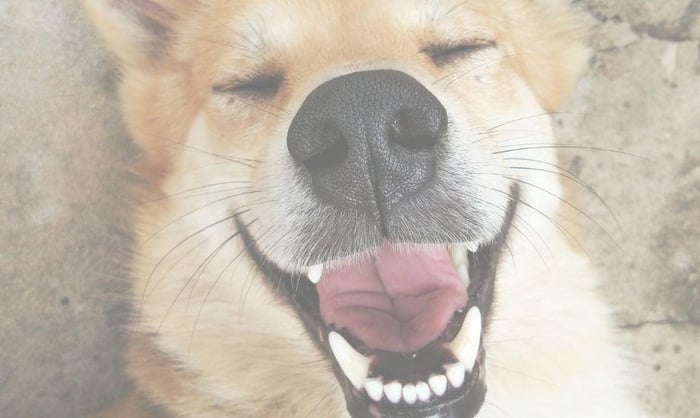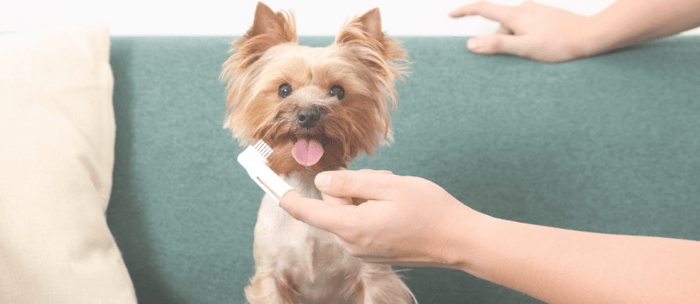Did You Know That February Is Dental Health Month For Our Pets?
This topic is often overlooked since it’s easy to forget what we don’t see everyday (it’s much easier to overlook an issue in our dog’s mouth than, for example, a limp!) That doesn’t mean dental health is less important... did you know that 80% of dogs have some form of dental disease by the time they are just 3 years old?. Maintaining good dental health and your dog's oral hygiene is just as important as it is for humans.
Just like with people, plaque can start forming in as little as 6 hours! How wild is that? This means that our dogs and cats need dental care too. But what exactly does that look like for our pets? Here are some general suggestions for you on how to keep dental health and your dog's teeth healthy throughout their lifetime!
Prevention is key!
One great way to naturally clean your bud’s teeth is to feed raw, meaty bones. Bones can lead to tooth fractures so it is best to limit the amount of time that they chew on these tasty treats to about 10-15 minutes a day, and always under supervision to make sure they aren’t choking on any small pieces. The mechanical action of your dog pulling bits of meat, gristle, and cartilage off the bone and their teeth scraping against the bone helps to clean off plaque.
Diet and well-balanced nutrition really affect your dog’s teeth, just as they do with humans. Good nutrition from quality dog food promotes dental health and your dog's ability to fight gum disease. There are some great minerals that can play an important part in dental health such as:
- Antioxidants: great anti-inflammatories! When there is a proper balance between free radicals and antioxidants, healthy periodontal tissue is able to thrive.
- Zinc: not only helps prevent plaque from forming but is also crucial for healthy strong gums
- Vitamin C, omega 3 and fatty acids: can also help to manage periodontal inflammation. (Fish oil is an awesome source of these!)
- Calcium: essential for strong bones! If our pups don’t have enough calcium in their diet, they will then absorb it from their own bones, leading to a weakening of where your pup’s teeth attach to their jaw.
- Probiotics: beneficial in keeping the oral microbiome healthy and balanced, allowing your dog to be able to fight off any bad bacteria
Teeth brushing at home is a great way to ensure plaque is not building up! Some of our four-legged pals may not be very comfortable having us look in their mouths. Over time and with some patience and positive reinforcement, we can definitely train our dog to be comfortable with both having their mouth looked at and to actually have their teeth brushed.
A great way to get your pup used to teeth brushing is to start gently massaging their gums in a circular motion a couple times a day. You can start with short periods of time and slowly increase how long you do this for. Make sure you give lots of verbal praise (and finishing the session off with their favourite treat never hurts either!) Next, add a tiny amount of the dog-safe toothpaste you are using to their lips so they can get used to the taste and texture. Following this, start working in the instrument you are using to clean your bud’s teeth - this can be a dog-safe toothbrush (there are some that fit right on your finger), or a clean piece of gauze. Lastly, start using the toothpaste on your toothbrush or gauze, and you’re all set! Brushing your dog's teeth and monitoring dental health and your dog's mouth regularly can prevent painful dental diseases.
If your pup is just not comfortable having their teeth brushed, there are tooth wipes available. These cloths are specifically designed to be rubbed against the tooth to help remove plaque, but they aren’t able to get into the small nooks and crannies like a toothbrush can.
Although all of these options will help prevent plaque buildup, in order to be most effective you need to start with a clean slate! The best way to do this is to have your vet perform a professional cleaning as they are experienced in preventing, locating, and treating any issues. This is definitely a more expensive option than the others that we have discussed, and does require your dog to have anesthesia to get x-rays and properly examine under the gumline, where most of the dental disease actually exists and isn’t visible while your pet is awake. It is also the most effective way to treat any active disease, as most other options will assist in preventing disease rather than treating it. While regular at-home care is crucial for maintaining good dental health and your dog's oral hygiene, having your veterinarian perform professional cleanings and exams under anesthesia allows for the most effective treatment and prevention of dental disease and ensures your dog's long-term dental health and well-being.
It’s also a good idea to lift up your dog’s lips once a week to make sure that their gums are pink and healthy looking, not red or white, and that you don’t see brown tartar building up. Some other signs of poor dental health can be really bad breath, vomiting, loss of appetite or drinking water, dropping their food out of their mouth, and excessive drooling.
If you’re feeling overwhelmed by all of this information, don’t worry! We are going to keep talking about dental health all month, and many vets offer a discount on dental cleanings during the month of February. Don't neglect monitoring dental health and your dog's mouth - their wellbeing depends on it!






